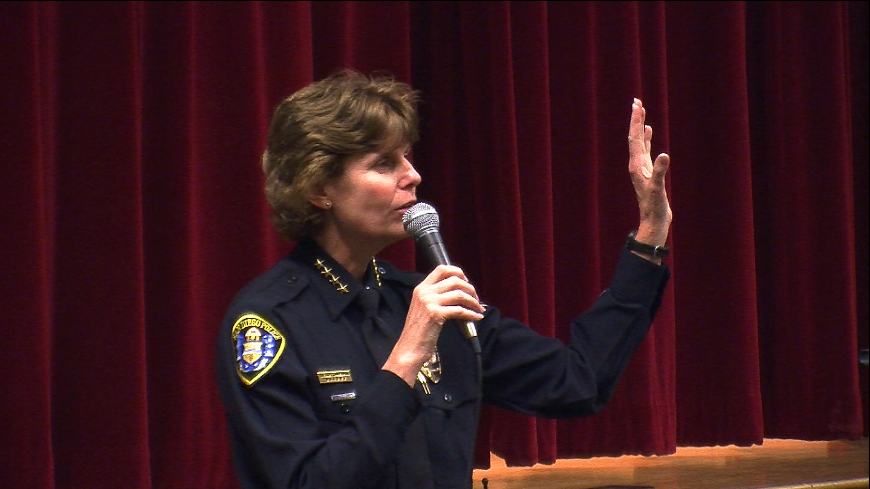San Diego Police Chief Shelley Zimmerman is scheduled this week to update the city on progress she’s made since federal auditors found gaps in supervision and accountability for police officers.
In a report to the city’s Public Safety and Livable Neighborhoods Committee, Zimmerman said she has implemented, or is in the process of implementing, 40 recommendations that came out of a federal audit in March. Zimmerman and city leaders called in the Police Executive Research Forum, an independent auditing agency contracted by the U.S. Department of Justice, following a string of high-profile misconduct cases.
Zimmerman said she’s increased the ranks of supervising sergeants and boosted their training in officer discipline.
PERF reviewed 17 cases, including repeated sexual assaults by former officer Anthony Arevalos, and found supervisors “allowed misconduct to occur and go undetected for some time.”
Another challenge in holding officers accountable was poor communication between the department and the Citizens’ Review Board on Police Practices, a volunteer board that takes and investigates citizen complaints against officers.
Both groups are now sharing information via computer software.
Sharmaine Moseley, executive director for the review board, said for the first time her team can track how the department handles complaints and share that information with the affected parties and the community at large.
“I’m trying to get as much information out there to the public in terms of how many complaints and what kind of complaints are being made against the department,” Moseley said. “We will have more transparency. This is a huge step forward.”
Moseley, who came to San Diego from Albany, N.Y. in January, said she would include the data in her semi-annual reports, which are public record.
“At first I was like, ‘Oh my gosh,’” said Moseley of her first impression of the turmoil confronting the department. “But what I’m seeing is the police chief and the community really working to improve the relationship.”
To that end, Zimmerman has implemented more diversity training for all sworn staff. New recruits graduating from the police academy in August will be the first to complete special field training requiring them to meet with leaders in diverse communities. And LGBTQ and Muslim groups have been invited to officer line-ups to offer insight on cultural sensitivity.
One remaining gap is the department’s early warning system. The computer system is supposed to track officer complaints and discipline, and notify supervisors of troubling patterns. That didn’t happen for several officers who have been criminally charged and have cost the city millions. The department is still researching systems in other cities and has yet to sketch out a plan for upgrades, which could be costly.
Zimmerman is scheduled to discuss these points and more Wednesday at the City Council’s Public Safety and Livable Neighborhoods Committee.

